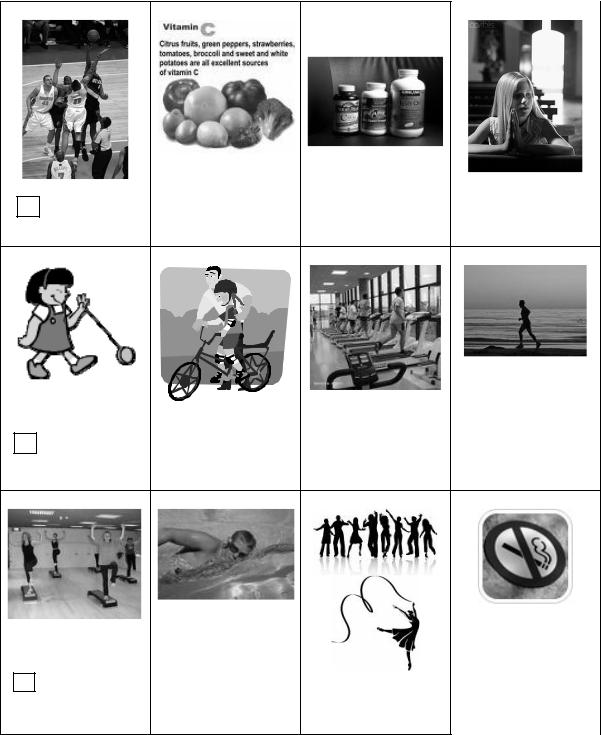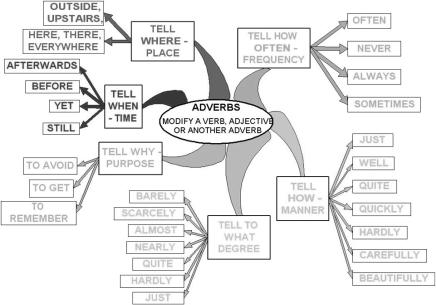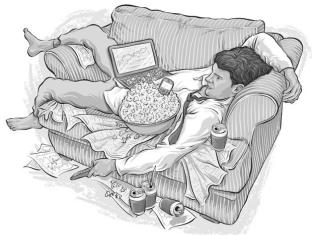
английский язык для общих целей
.pdf
###
Name: Keith Lewis Age: 17
Job: Babysitter Hours: 10 per week Pay: $ 5. 00 per hour
“This is the best job in the world. My parents have many friends with younger children. They call me when they want to go to a restaurant or pub for the evening. When I arrive the children are usually already in bed. I sit in the living room and watch TV. The children almost never wake up, and anyway they are not usually babies, so I just can tell them to go back to sleep. The best thing in this job is that I don’t need to pay any extra money – it is all cash-in-hand.”
###
Name: Tom Maxwell Age: 15
Job: Fast-food Restaurant Worker Hours: 8 per week
Pay: $ 4. 50 per hour
“I love this job. It’s never boring because you are busy all the time. You can talk with your colleagues and have fun while you work. You also can get discount on the food here. I have to say that I am not so keen on burgers now I have been working here for 6 months. My job is a Saturday job. I am saving to buy a car when I am seventeen.”
Speaking
Discuss the following.
Have you ever taken any jobs?
At what age are young people allowed to work abroad/in Russia? What jobs can they get?
What kinds of jobs are available for students abroad/in Russia?
Communicating. Asking for information
Asking for information can be as simple as asking for the time, or as complicated as asking for details about a complicated process. In both cases, it's important to use an appropriate form to the situation. For example, when asking for information from a friend, use a more informal form. When asking a colleague, use a slightly more formal form. Finally, when asking for information from a stranger, use an appropriately formal construction.
50
Asking for Information
Very Informal - for Friends and Family
Simple Question: Wh? + Helping Verb + Subject + Verb
If you are asking a friend or family member for information, use a direct a question.
How much does it cost? Where does she live?
More Formal for Everyday Simple Questions
Use these forms for simple, everyday questions in stores, with colleagues at work, and in other informal situations.
(Pardon me, Excuse me) Can / could you tell me + wh? + S + verb?
Can you tell me when the train arrives?
Pardon me, could you tell me how much the book costs?
Formal for More Complicated Questions and Asking Important People Questions
Use these forms when asking complicated questions that require a lot of information, as well as asking information questions of important people such as your boss, on a job interview, etc.
I wonder if you could + tell me / explain / provide information on ...
I wonder if you could explain how health insurance is handled at your company. I wonder if you could provide information on your pricing structure.
Would you mind + verb + ing ...?
Would you mind telling me a little bit more about benefits at this company? Would you mind going over the savings plan again?
Replying to a Request for Information
If you would like to provide information when asked for information, start your reply with one of the following phrases.
Informal
Sure
No problem. Let me see ...
More Formal
I'd be happy to answer that.
I should be able to answer your question. It'd be a pleasure to help you.
When providing information people will sometimes also offer to help in other ways. See the example conversations below for an example.
Saying No
If you do not have the answer to a request for information, use one of the phrases below to indicate that you are unable to answer the question.
Informal
Sorry, I can't help you out. Sorry, but I don't know that. That's beyond me.
More Formal
I'm afraid I don't have the answer to that question.
I'd like to help you. Unfortunately, I don't have that information / don't know.
Saying 'no', is never fun, but sometimes it's necessary. It's common to offer a suggestion as to where someone might find out the information required.
(from http://esl.about.com/od/smalltalk/a/Asking-For-Information-In-English.htm)
51
Role play
Group work. Split into groups.
Group A. Presents job vacancies for students offered by youth centres/state/business/non-profit organizations.
Group B (students). Asks questions about job requirements, employment and working conditions, salary.
Reading for Information
Culture clip
Are Britain’s Teenagers the Worst in Europe?
New research, conducted by the Institute for Public Policy Research (IPPR), shows that British young people are the worst behaved in Europe!
‘HANGING OUT WITH MATES’ is what teenagers do in the UK. In England and Wales, 45 % of 15-year- old boys spend most evenings out with their friends. In Scotland, the number is 59%. But in France, only 17 % of teenagers go out with their mates at night. In Portugal this figure stands at just 7%.
Only Ukraine ranked higher than Scotland, with 60% of boys and 40% of girls spending four evenings or more a week with their friends.
Lots of British teens don't sit down for meals with their parents. In Italy, 93% eat regularly with their families. In France, 89% eat at home. But only 64% of British teenagers eat meals at home.
According to IPPR, British teens get drunk more often and get involved in more fights than teens in other countries. They are also more aggressive and more anti-social.
Researches think that teenagers in Britain are more out of control because they have less contact with adults, especially parents, than in the rest of Europe.
Police in Britain have tried to control troublesome teens through anti-social behaviour orders, known as ASBOs. These orders are a special set of rules which are given to someone whose behaviour is causing problems. The orders can be handed out for graffiti, noise, throwing things, being with known gang members. Kids and teenagers who receive ASBOs can have their names made public — on ‘walls of shame’! However, for many teens earning ASBO attention is a matter of pride.
There have also been attempts to control what young people wear. Many shopping centres in the UK have banned hoodies because 'it's a fashion worn by potential criminals who don't want to be recognized on surveillance cameras.' The government and the Prime Minister, Tony Blair, have publicly backed the decision. But teenagers and civil liberties groups say that this is discrimination and that the government 'confuses fashion with behaviour.' They take part in all sorts of protests and continue to wear hoodies. And they DON'T AGREE that they are the 'worst in Europe'!
Would you believe it?
A 16-year-old boy from Manchester has been given an ASBO that bans him from wearing a hooded top for five years! The ASBO also bans him from meeting more than two people at once, apart from his family.
In February 2006, a 58-year-old teacher who was wearing a hooded top was asked to take it off when he entered a big supermarket in Swindon. “I was wearing the hood because my hair was a mess,” he said. The shop said it was taking action to 'make sure this doesn't happen again.'
Lady Sovereign, a famous British rapper, has started a campaign called 'SAVE THE HOODIE'. 'Wearing a hoody doesn't make it a criminal or gang member,' she says. If someone commits a crime it's not about what they wear, it's about a person wearing it. A criminal is a criminal no matter what they wear... Don't blame the hoody; you should be able to wear what you want!
52

Notes
to hang out - болтаться, околачиваться matter of pride предмет гордости attempt [a'tempt] - попытка
to ban - запрещать
hoodie ['hudi] - рубаха или футболка с капюшоном, «балахон» potential criminal [pa′tenjl 'krımınl] - потенциальный преступник surveillance [sз:'veiləns] - camera камера наблюдения
civil liberties groupорганизация no защите прав человека
Speaking
Discuss the following .
Compare teens all over the world. Which country ranks first in the number of troublesome teenagers? What about Russia? What are major youth problems?
What is the role of state institutions and governmental bodies in fostering youth?
Compare British and Russian situation with young people:
•Young people spend most of the time ………;
•They are ………….;
•At home with their parents children …………;
•People have the right to do ……/ to wear ……../to tell ………../ to behave ……..,etc.
Project work. Choose the works of famous Russian writers: e.g. A. Pushkin, F. Dostoevskiy, L. Tolstoi, etc. Find examples of generation gap. Analyze the solutions suggested in the novels. Share with your group mates.
Unit 4. Lifestyle
4.1. How to Stay Active and Healthy
Lead in
Everyone wants to be happy. But each person looks for happiness in a different way. Each wants his or her own kind of life. The way you spend your time is called lifestyle.
What constitutes an active lifestyle?
How do you stay healthy?
Vocabulary
1. Check the words in the box.
●to eat a healthy diet ● high/low-calorie ● take vitamins ●lose/put on weight ●cut down on sugar/fat ●give up smoking/junk food ●keep fit ●go swimming/dancing/jogging/skiing/skating/cycling ●working out in gym
53

2.Look at the pictures. Check (√) the things you do to stay healthy (TCP/PRC License No. 1042051)
I play sports. |
|
I eat healthy |
|
I take vitamins. |
|
|
|
|
|
|
|||
|
foods. |
|
|
I meditate. |
||
|
|
|
|
|
I walk a lot. |
|
I ride a |
|
I work out in a |
|
I jog. |
|
bicycle. |
|
|
|||
|
|
gym. |
|
|
||
|
|
|
|
|||
|
|
|
|
|
|
I do aerobics. |
|
I swim. |
|
I dance. |
|
I don’t smoke. |
|
|
|
||||
|
|
|
|
|
|
Reading
You are going to read answers from a survey about staying healthy. The survey question is “How do you stay healthy?”Read the survey silently. Look for the answer to the survey question how each of the six stays healthy.
54

SURVEY: HOW DO YOU STAY HEALTHY? |
|||
|
|
|
|
Lyn Cone |
Li Chang |
Herb Wood |
|
Age: 48 years old |
|||
Age: 88 years old |
Age: 24 years old |
||
“Stay healthy? Well… I |
|||
“I don’t exercise. I just enjoy |
“I go to a gym three |
||
smoke. And I don’t |
|||
life. Keep smiling, I always |
times a week. I usually go |
||
exercise. I sit at a desk all |
|||
say.” |
after work.” |
day. I do take |
|
|
|
||
|
|
vitamins…sometimes.” |
|
|
|
|
|
Nobuyuki Oda |
Velia Cruz |
Megumi Saito |
|
Age: 35 years old |
|||
Age: 52 years old |
Age: 28 years old |
||
“I have three children. |
|||
“I get my exercise at my job. |
“I love sports – all kinds! |
||
One is three. One is four. |
|||
I’m a construction worker. I |
I love tennis, soccer, |
||
One is six. They’re |
|||
stand from 8 in the morning to 6 |
baseball, and basketball. |
||
always running. I can |
|||
in the evening. I’m always |
I have to work during the |
||
never sit down. That’s my |
|||
bending and lifting heavy |
week but I try to play |
||
exercise – running after |
|||
things. Do you want to see my |
sports on the weekends.” |
||
children. Oh…excuse |
|||
muscles?” |
|
||
|
me…there they go now!” |
||
|
|
||
|
|
|
|
Practice
1. Which one is a healthy lifestyle? Check (√) the appropriate answers.
jogging |
taking vitamins |
swimming |
doing aerobics |
dancing |
drinking too much alcohol |
smoking |
getting enough to sleep |
meditating |
going to bed late |
walking a lot |
eating junk food |
playing sport |
working out in a gym |
riding a bicycle |
playing computer games at night |
drinking beer every day |
taking yoga classes |
staying in good moods |
eating healthy food |
55

2. Mark the statements as true(T) or false (F). T F
Aerobics is bad Dancing is healthy. Jogging is unhealthy. Lyn Cone enjoys life Velia Cruz plays sports. Li Chang goes to a gym.
Smoking is good for you.
Walking is not good for your health. Vitamin supplements are dangerous. Swimming is a good way to exercise. Megumi Saito runs after her children. Nobuyuki Oda gets exercise at his job.
A sport is not beneficial to one’s health. Herb Wood takes vitamins…sometimes.
Riding a bicycle is not beneficial to your health. Laughter is a good medicine to keep you healthy. Working out in a gym is not beneficial to good health
Fruits and vegetables do not contribute to health and nutrition. Spending some quiet moments to meditate is good for your health Watching television is good for your health.
(from http://ru.scribd.com/doc/24563372/Lesson-Planning-Activity-5-Healthy-Lifestyle#scribd)
Writing
Write down your reflection on what you have learned about healthy way of living.
Speaking
1. Situation 1
Read the dialogue in pairs.
S: Excuse me. Are you Harry ?
H: Yes, I am. Do I know you? I think, I have seen you before.
S: Of course. Don’t you remember me? I’m Sarah. We first met in a seminar devoted to World Health Day.
H: Oh, yea. I have nearly forgotten about it. How are you? What did you get from the seminar?
S: I did what the lecturer said. I practiced a balanced diet. I only eat for breakfast, lunch and dinner. I also take some vitamins. What about you? Have you stopped eating junk food? You were a junk food lover, weren’t you?
H: I was. But now I realize that I feel healthier than ever after avoiding myself from eating junk food. Now I don’t get tired so easily.
S: That’s good for you. Do you know that exercising does your body good? It stimulates our heart and lungs work more efficiently. I usually work out 3 times a week. With all this, we can gain a better life with healthy body and mind.
H: That’s true, Sarah. I have to go now. I have some work to do at home. It’s really so nice to see you. Keep in touch, okay?
S: Okay. Bye.
Act the situation out.
56

2. Situation 2.
Martha is on a diet to lose weight, but her friend is trying to coax her into eating a bowl of icecream. Can Martha stand the temptation?
Read the dialogue in pairs.
Sydney: Would you like to have some ice-cream? I've got a variety of flavors for you to choose from. I've got strawberry, peach, chocolate, chocolate chip, chocolate brownie, coffee, vanilla, rocky road, butter pecan, and praline.
Martha: Wow! What choices you have! I wish I could, but I just can't. I'm on a diet to lose weight.
Sydney:Come on, it's just a bite. It doesn't really hurt to have just a bite. Martha: I'd better not. Please don't tempt me. Please!
Sydney: Gee! You are really strong-willed.
Martha: You're darn right. I'm not so easily coaxed into doing something that I think is wrong. Sydney: Well, I'd better not tempt you. Otherwise, if I give you a piece of cake, you might ask for a glass of milk.
Act the situation out.
Grammar spot
1.Go to Grammar Focus to revise the material about adverbs.
2.To study the material in more detail go to http://www.grammarquizzes.com/adverbsum.htm
l
Write out sentence examples and translate them
3.Study the mind map.
Make up your own mindmap.
2. Think, pair and share.
Tell the class what you do often/seldom/never/sometimes.
Project work. Find a short newspaper article about heathy lifestyle and discuss it with your group mates.
57

4.2. A Generation of Сouch Potatoes
(http://www.teachingenglish.org.uk/sites/teacheng/files/potatoes)
Lead in
Do you know what coach potato means?
What types of behaviour could be described as lazy?
Task 1.Questionnaire : How active are you? Interview each other in pairs and try to decide which has the most active lifestyle.
1) How often do you walk more than a kilometre?
•Every day
•Once a week
•Once or twice a month
•Very rarely
•Never!
2). When was the last time you took any form of physical exercise? (swimming, running, dancing)
•Yesterday
•Last week
•Last month
•A long time ago
•I can’t remember
3)Tick any of the following activities if you do them regularly:
•Cycling
•Watching TV
•Playing team games (football, rugby)
•Watching team games
•Playing computer games
•Surfing the net
•Walking in the countryside
•Listening to music in your room
•Playing outside/in the garden/in the street
•Going to a gym
•Texting your friends
Task 2. Your health Group/pair work.
Can you calculate the number of hours you spend on the activities per day or per week? (e.g. I spend 2 hours a day cycling to school and one hour a day watching TV).
•Which of the activities in the questionnaire might be good for your heart?
•Which activities can be called sedentary?
•Give other examples of sedentary activities.
Reading
1. Read the text and answer the questions.
•How does your lifestyle compare to British teenagers?
•Are they more active than you?
58
A Generation of Couch Potatoes
Lots of teenagers have posters of their sports hero on their bedroom wall. But do they follow the healthy examples set by these athletes? British parents are worried that young people are not as fit and healthy as in the past. Why is this?
According to the British Heart Foundation, 13 to 15 year olds are spending too much time doing sedentary activities such as watching TV or playing computer games. A special report describes a generation of couch potatoes , young people sitting around at home, growing up in their bedrooms, travelling by car and in serious danger of heart disease as they get older. Is this their fault ? Are young people lazy?
Many parents don’t allow their children to play outside or walk to school by themselves. “ I ring my Dad on my mobile and he picks me up from the station. It’s 10 minutes walk from home but he thinks it is dangerous”, says 14 year old Carrie. Some teenagers blame their over protective parents for making them unfit. It is certainly becoming more difficult to encourage young people to have an active life and protect their hearts. In recent years schools have spent less time on sports. “My Mum did lots of hockey and netball at school but we didn’t have time for that this year because we had so many exams to prepare”, says Ben 16.
Practice
Group work. Talk about lifestyles in your country
How does your lifestyle compare to your grandparents’ lives? Has anything changed? You may start with “Our grandparents had better lives”… Agree or disagree.
Discuss these topics:
•transport
•diet
•home
•life
•spare time activities
•physical activities
Writing
Write an opinion essay “Are video games a good way to keep fit?
Go to http://learnenglishteens.britishcouncil.org/sites/teens/files/an_opinion_essay_- _exercises.pdf
Project work 1.Fitness survey”
Make a survey for your class to measure fitness levels. Ask questions using:
•How often do you .....?
•When was the last time you .....?
Present and discuss the results.
2.Fitness campaign
Think of 4 ways to encourage young people in your area to improve their fitness (posters, adverts).
• How can you encourage a more active lifestyle at home and at the university? Use expressions such as:
I think we should;
It might be a good idea to..; Why don’t we'.
Discussion
Debates: Attitudes towards lifestyles and healthy living
Do you agree or disagree with these statements?
•Young people are naturally fit and healthy and don’t need much exercise
•Eating fast food is OK if you don’t eat it every day
59
